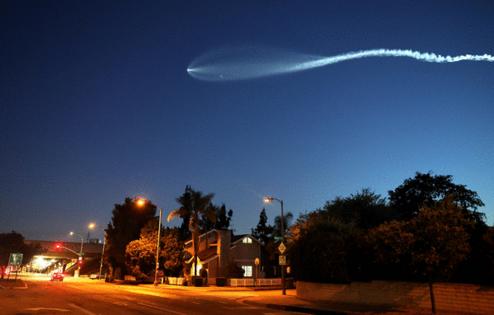Commentary: Why is California losing good jobs to other states? It's not rocket science
Published in Op Eds
For a century, it worked, and brilliantly. The “California model” rested on massive investments in higher education, development of industrial zones in places such as the South Bay and Silicon Valley, and persistent upgrading of basic infrastructure.
Yet the system that made California dynamic and prosperous for so long is now broken and backward-looking. The state still provides ample opportunities for technological and financial elites but leaves behind a broad spectrum of the middle and working classes.
This failure is reflected in the state’s poverty and unemployment rates (both the highest in the nation), and its tepid job growth. Meanwhile other states — Texas, Florida, Arizona, the Carolinas and Tennessee, for example — have copied the California model and they have done it, as Californians once did, based on the goal of lifting up all classes. Long reactionary in their politics and social structure, these states’ business-friendly policies now have something to teach the progressive Golden State.
The defense and aerospace industries are showcases for California’s problem and missed opportunities. The state still leads in numbers of aerospace engineers and creates cutting-edge technologies. But once companies develop products based on all that innovation, they’ve tended to move the manufacturing, with its high paying blue-collar jobs, elsewhere, chasing fewer regulations, cheaper energy and a less expensive cost of living.
Take Jet Zero, which makes fuel-efficient planes. The company, based in Long Beach, is ready for prime time, with large orders for its new planes. But those jets will be built in Greensboro, North Carolina, in a $4.7 billion plant employing more than 14,000 people over the next decade. The company also plans to move its headquarters to Greensboro when the plant is finished.
Elon Musk’s story is well-known. The space economy is expected to be worth trillions, but Musk’s rocket company has already decamped in large part from California to Texas. Space X and Jeff Bezos’ Blue Origin have built large test facilities in Brownsville and Van Horn, Texas, bringing a blue-collar bonanza to traditionally poor regions. And Space X is rumored to be investing upward of $1 billion to turn the Astrodome in Houston into its Mission Control Alpha.
Even companies that plan to stay headquartered in California are making big investments elsewhere. Anduril, a fast growing tech-driven defense company, designs its systems in Orange County but has announced plans to build a 4,000-job plant in Ohio and is also expanding its operations in Mississippi.
This pattern should alarm the state’s leaders who seem more concerned with boosting green energy, fighting Trump and saving Hollywood. Assemblyman Al Muratsuchi has been pushing for a space commission, as exists in Texas and Florida, but so far to no effect. The California Coastal Commission’s recent rejection of Space X’s request to double launches at Vandenberg Space Force Base, ostensibly over environmental questions, is another sign that the state’s focus is anywhere but on aerospace.
The loss of potential new aerospace investment is tragic. Imagine if Anduril’s and Jet Zero’s plants were going up in Fresno, Bakersfield, San Bernardino or Modesto — areas afflicted with high levels of poverty. Manufacturing remains the key to productivity growth, packs a far higher multiplier effect on local economies than retail, trade or finance and generally pays far higher wages.
You might hope that California’s tech sector would make up for the loss, one of many in a long decline in industrial jobs in the states. But in tech too, California is losing to emerging players. The Computing Technology Industry Assn. 2024 assessment found that Texas led in new tech jobs, with Florida second, and Georgia, Tennessee and North Carolina making significant gains. California, not surprisingly, isn’t high on the association’s list of states projected to enjoy the biggest growth in the sector over the next decade.
Artificial intelligence and Washington-pushed chip manufacturing could prove a new source of growth, and at the very least create capital gains needed to boost the state’s poor fiscal position. However, California’s highest in the nation energy prices, tough land-use regulations and lack of blue-collar skills education discourage the construction of new data centers by the likes of Nvidia and Samsung.
To be sure, the Bay Area is an AI startup epicenter but this is likely to offer opportunities for the investor class, a handful of entrepreneurs and well-compensated “genius” programmers, not middle- and working-class Californians.
Is there hope for a recovery? San Francisco city economist Ted Egan suggests President Trump’s tariffs, with their emphasis on electronic goods, could help make California an ideal place for “reshoring” various kinds of aerospace, computer and other tech manufacturing, but only if the California model is modernized to suit these industries’ land use and energy needs.
And there are California entrepreneurs — bred to look at and shape the future — who are not ready to abandon the state’s reservoir of expertise and talent, and who are committed to making things as well as developing concepts. “We’re inventing the new factory town, and recovering the sense of what works in America,” says Cameron Schiller, whose Rangeview Corporation startup uses 3-D technology to make castings for the metal parts used in aerospace, one of dozens of industrial startups in the former aerospace stronghold of El Segundo.
To revive the California model, we need dedicated visionaries and an evolving workforce, but mostly we need state government to remember what it means to be willing and able to help the visionaries and the workers succeed.
____
Joel Kotkin is a contributing writer to Opinion, the presidential fellow for urban futures at Chapman University and senior research fellow at the Civitas Institute at the University of Texas, Austin.
©2025 Los Angeles Times. Visit at latimes.com. Distributed by Tribune Content Agency, LLC.
























































Comments